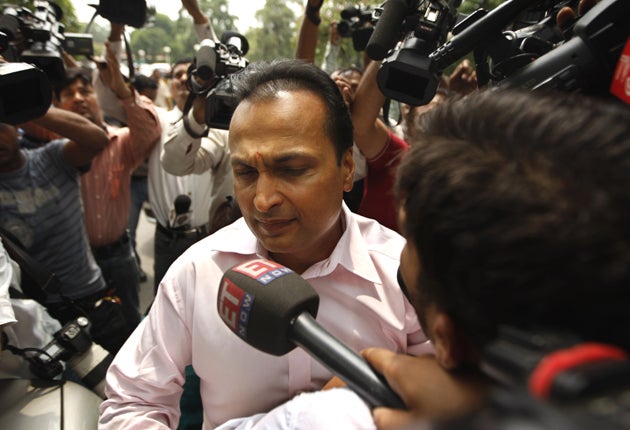Elder brother wins India's battle of the billionaires

Your support helps us to tell the story
From reproductive rights to climate change to Big Tech, The Independent is on the ground when the story is developing. Whether it's investigating the financials of Elon Musk's pro-Trump PAC or producing our latest documentary, 'The A Word', which shines a light on the American women fighting for reproductive rights, we know how important it is to parse out the facts from the messaging.
At such a critical moment in US history, we need reporters on the ground. Your donation allows us to keep sending journalists to speak to both sides of the story.
The Independent is trusted by Americans across the entire political spectrum. And unlike many other quality news outlets, we choose not to lock Americans out of our reporting and analysis with paywalls. We believe quality journalism should be available to everyone, paid for by those who can afford it.
Your support makes all the difference.A long-standing dispute between India's wealthiest siblings over the price of natural gas ended yesterday after the country's highest court ruled in favour of the richest of the two brothers.
For five years Mukesh and Anil Ambani, two of India's most powerful industrialists and once listed respectively as the fifth and sixth richest people on the planet, had contested the details of a deal under which gas was sold between them. In 2005, Mukesh had agreed a deal to sell gas to the younger brother's company at half the rate set by the government.
As the price of that natural gas rose, so 53-year-old Mukesh sought to nullify the agreement, saying that it had never been approved by the government. Yesterday, the supreme court agreed with the elder brother, effectively ruling that the Indian government alone has the right to fix the price of such natural resources.
"Today the court has unambiguously ruled that the government is the absolute owner, the constitutional owner, the sovereign owner of gas," the government's lawyer, Mohan Parasaran, told reporters outside the court. "It has got the absolute right to regulate the sale of gas."
The ruling is important for a booming country hungry for energy and where the production of oil and gas has been slowed as a result of the family disagreement. Beyond that it marks the latest turn in the twisting story of the acrimonious relationship between the Ambani brothers, two men, so some commentators have claimed, who have been allowed to put their own interests ahead of those of the country.
The falling out between the pair followed the death of their father, Dhirubhai Ambani, one of India's first major tycoons but a man who died without a will.
The late industrialist's widow brokered a deal between the two brothers to split the business empire, with the oil and gas interests going to Mukesh, while the power, telecommunications, entertainment and financial services elements went to Anil.
As part of the deal, Mukesh agreed to provide cheap gas from the Krishna Godavari basin off India's east coast, which his company operates, for his brother's power generation interests. The elder brother sought to breach the deal, once the rising cost of gas and oil meant he was going to lose out.
For Mukesh, currently listed by Forbes magazine as the fourth richest man and said to be worth $29bn (£20bn), yesterday's court ruling means he could gather even more money. Reuters reported that he could be in for a considerable windfall, with his Reliance Industries estimating it could make $11.5bn from the gas it has agreed to sell at the government fixed price. Reliance Industries has previously estimated that by selling the same gas at the rate agreed in the 2005 deal the company was set to lose $5.4bn.
Anil, 51, worth an estimated $14bn and listed as the 36th richest person, is expecting his Anil Dhirubhai Ambani Group to be hit badly by the ruling. Last July, he reportedly told shareholders that the gas supply contract was a "primary asset".
Such has been the animosity between the two brothers that Mukesh moved out of the Mumbai mansion that the joint family had shared. He is now completing a 27-storey tower in a prime location of the city that will be one of the most expensive private homes ever built.
Feuds and family fortunes
*Sports brand rivals Adidas and Puma were owned by the same family of German cobblers until feuding brothers Adi and Rudi Dassler split the company 60 years ago. The argument is said to have been triggered in 1943 during a bomb raid, when Adi insulted the Allied forces but Rudi believed the comment was aimed at his family.
*In 2007, the widow of Fiat boss Gianni Agnelli accused her daughter Margherita de Pahlen of 'betraying' the late businessman's will. De Pahlen had filed a lawsuit against three of the family's advisers over her inheritance. She lost the court battle in March.
*Luxury department store Liberty heir Elizabeth Stewart-Liberty angered rival dynasty members in 1997 by leading a rebel shareholder bid to oust the chairman.
*Last month, the widows of American auto trader brothers Mark and James Clair Jr were in court accusing two other Clair brothers of trying to bully them out of a $20m fortune after their husbands' deaths. The trial continues.
Join our commenting forum
Join thought-provoking conversations, follow other Independent readers and see their replies
Comments